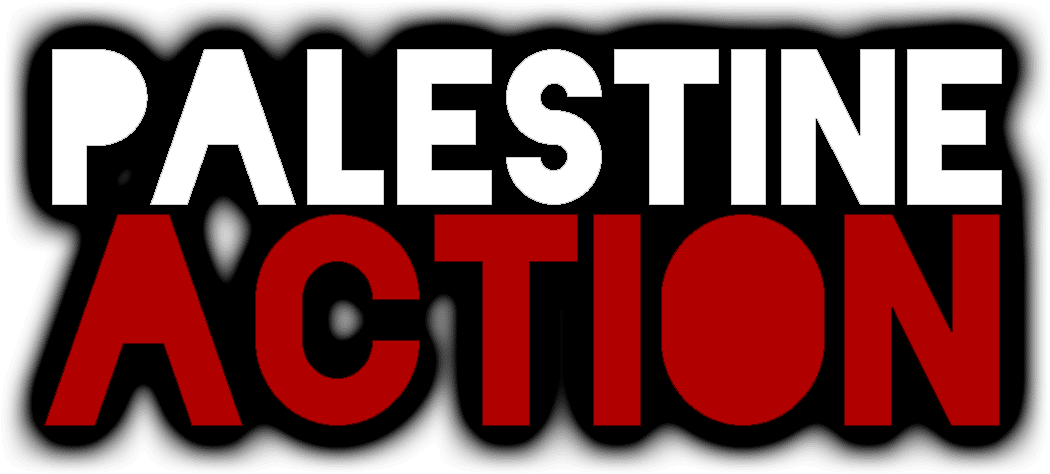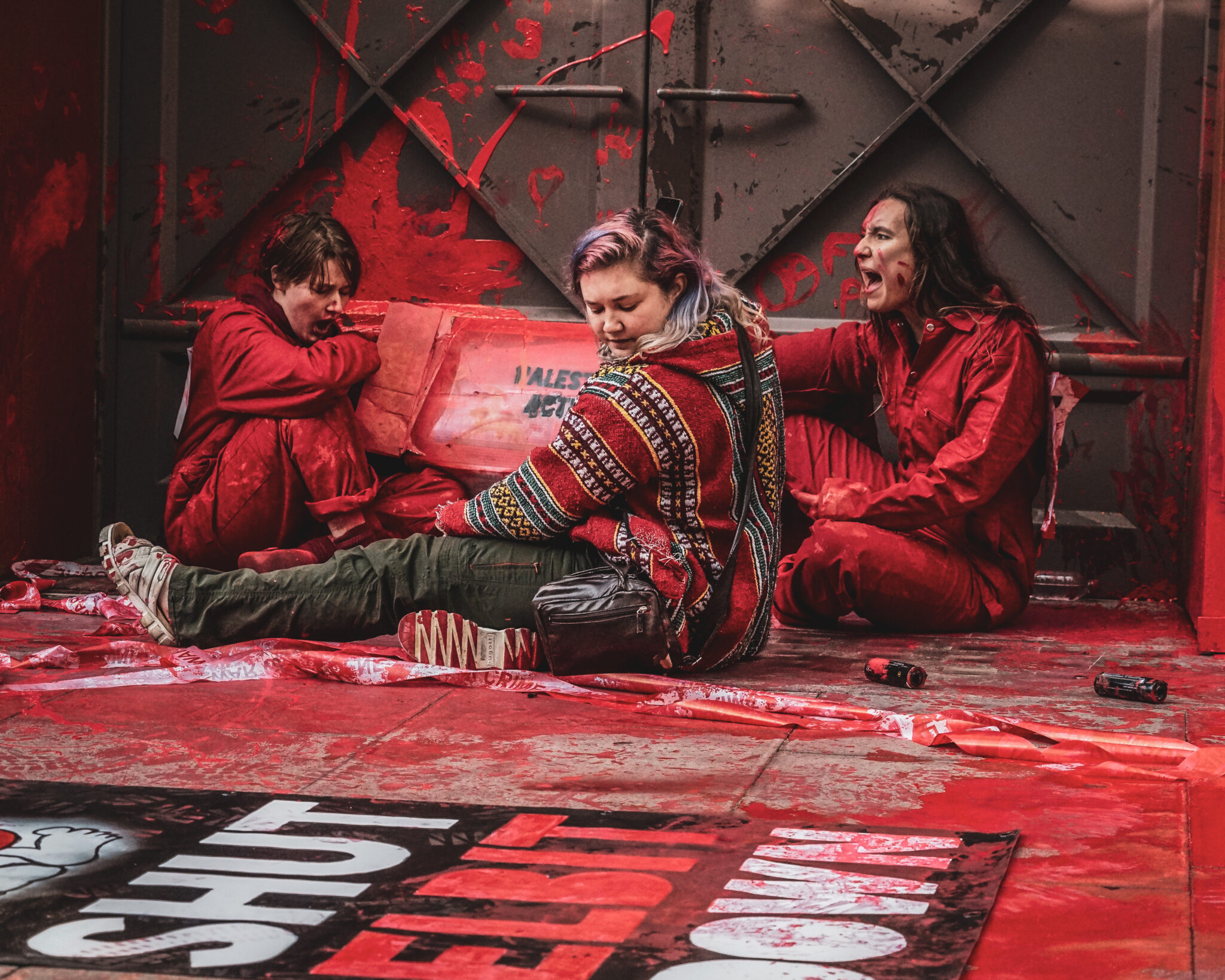On Friday 10th February, two Palestine Action activists were convicted of ‘criminal damage’ in Highbury Corner Magistrates Court, after they took action against the now-vacated headquarters of Israel’s largest arms firm, Elbit Systems. One was ordered to pay £600 in costs, while the other awarded no costs and a conditional discharge. The same conviction was handed down in Highbury Corner Magistrates Corner on Monday, with two activists were handed a conditional discharge along with £400 in court costs between them, as a pattern has started to emerge in recent criminal damage trials in Magistrates Courts.
The past months have seen a number of other convictions for ‘criminal damage’ charges against activists who took action at Elbit’s former headquarters, at 77 Kingsway, London. In January 2023, four activists were found guilty by the same judge in Highbury Corner Magistrates Court, and in November 2022 three activists, while acquitted on other charges, were found guilty of criminal damage by a judge in Stratford Magistrates Court. That makes 11 criminal damage convictions for actions against Elbit in Kingsway.
All have experienced the same process: Judges refuse to hear expert testimony on Elbit’s deathly activities, before withdrawing from defendants all defences related to the reason for taking the action in the first place. Had they gone to trial a year earlier, the outcomes would have likely been different. While Palestine Action have won a number of major victories in the Courts, moves to quash dissent by the state have made these convictions far easier to secure for the Crown Prosecution Service.
The state moves to silence dissent
The first Palestine Action case to go to trial, in December 2021, concerned three activists charged with ‘criminal damage’ for locking-on to the gates of Elbit’s UAV Engines factory in Stafford and throwing paint over the premises. These activists were acquitted, on the basis that a conviction would be disproportionate to defendants’ right to protest, especially considering that their beliefs were genuinely held and were rooted in “important issues”. These protest rights are enshrined in law under Articles 10 and 11 of the European Convention of Human Rights, protecting freedom of expression and assembly, while the judge also referred to the authority of the Supreme Court under the ruling DPP v Ziegler. The Ziegler ruling underscores the principle that restrictions on protest rights must be proportionate to the circumstances. Appealing to protest rights was not activists’ main defence – who have all argued that their actions are necessary and just in the face of the crimes facilitated by Elbit’s products – but Ziegler did open a route for judges to consider the proportionality of a conviction and thereby leading to acquittals
Since April 2022, these principles have been cut down, and activists facing criminal damage charges have found less success in the Magistrates courts. While new legislation has been created to hand greater powers to police, the major driver of the change in trial outcomes has instead been due to a less-publicised review of caselaw – meaning a change in the precedents set by other cases like Ziegler. Suella Braverman’s referral of the ‘Colston Four’ ruling to the Court of Appeal has rewritten the rules on these protest rights, limiting the circumstances in which they apply, and curtailing the defences that activists can rely on in Court.
As noted, activists have always held that actions taken are necessary and just in light of the crimes committed against Palestinians, and have not appealed to state-sanctioned liberties as the basis of taking direct action. However, the ruling has created significant restrictions on the evidence and defences available, constricting activists and diminishing their freedoms when giving testimony.
Since the Colston appeal ruling, Article 10 & 11 protest rights cannot be considered relevant if the protest is deemed ‘violent’ or ‘not peaceful’. In Palestine Action cases, judges have routinely used the throwing of paint as the deciding factor in deeming protests ‘not peaceful’. The irony is apparently lost on the judges that the ones throwing paint are deemed “not peaceful”, and any property ‘damage’ is considered “violent”, when the activists in question were targeting a multinational arms company whose products fuel the mass slaughter of Palestinians.
Not only has the Colston appeal enabled a major increase in judicial power to categorise protests as either peaceful or violent, but sections of the ruling seem to have been drafted with Palestine Action in mind. Specifically, paragraphs 102 & 121 outline that these protest rights are not relevant when damage is done to private property. Despite the fact that the initial Colston case concerned public property, in the form of a statue, the Colston appeal is concerned with protecting private property. This again reveals the absurdity of the state’s position: that property ‘damage’ against Elbit constitutes violence, while Elbit’s production of Israel’s weapons apparently constitutes a moral business practice.
Ironically, the Colston ruling further states that protest rights are not engaged where the damage is more than ‘trivial’. But the higher the damage is, the better the chance we have of winning the case. This is because for higher-level damage cases, activists will be entitled to a trial by jury, where it is randomly selected members of the public – not a paid judge – who deliver a verdict on the case. In a trial by jury, the public hear the reasons for taking action. Defendants are able to speak directly to the facts of the matter: that Elbit’s products fuel Israel’s murder of children, and action is taken for the sole reason of disrupting this business-of-bloodshed. This is what happened in Southwark Crown Court in November of last year – where a jury of 12 took less than an hour to unanimously acquit five activists who took aim at Elbit’s London HQ during an action in 2020.
But once again, the Colston ruling has been used to curtail this. Judges are able to rule out defences before the jury is introduced, meaning that defendants are censored in the evidence they are allowed to give. When the rights of Articles 10 and 11 are excluded, defendants are prohibited from introducing vast swathes of evidence about why they took action. This is what happened in Manchester in January month: two defendants had their defences withdrawn by the judge, shortly before finding out that their trial will be postponed until November 2023. These article 10 & 11 rights are not the only defences available to activists, but they are the only route through which judges can be forced to consider whether a conviction would be proportionate to a person’s freedoms.
Resistance in the face of repression
The point of this, however, is not that these laws and authorities are unjust (as this much is obvious). The point is that direct action works. If it didn’t, the state would not be driven to rewrite its laws to protect Israel’s weapons base. It wouldn’t censor activists in the dock, telling them that they can’t speak on Palestinian’s human rights or Israel’s war crimes. It wouldn’t be bringing dozens of cases against activists, and Elbit wouldn’t send note-takers to each trial to advise the Crown on how to run their prosecutions.
Repression is to be expected, and without it there would be no need for the resistance. It has been clear for decades that the government will not listen to citizens who want to see an end to British complicity in Israel’s apartheid. Now that people are able to do something about it, using direct action to create their own change, it is predictable that the state is moving to silence and prosecute activists. There is only one real option available for actionists in the face of this: increasing our resistance in the face of repression, in the full knowledge that it will ultimately bring us victory.
The ending of Israel’s weapons production on British soil was always going to be something that had to be won by the people, not something that would be gifted by the state.

